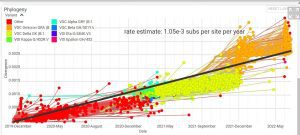Scientists across the world are wary of a new wave of Covid-19 because this sublineage has eight mutations.

While experts from these states ruled out any reason to panic right now, they said it could be an indication of another Covid-19 wave. (Creative Commons)
Karnataka and Telangana are two among the 10 states in India reporting incidences of BA.2.75, a sublineage of the Covid-19 Omicron variant BA.2.
While experts from these states ruled out any reason to panic right now, they said it could be an indication of another Covid-19 wave.
The experts predicted that a high number of cases of BA.2.75 infection could be reported as it is said to have a high ability to infect those infected before.
The BA.2.75 has a high ability to infect those who are completely vaccinated by the Covid-19 vaccine, according to the experts.

Phylodynamics of pandemic coronavirus in India updated by the Indian SARS-CoV-2 Genomics Consortium (INSACOG). Source: data from 3,428 of 3,428 genomes collected between March 2020 and June 2022, last updated 2022-07-02
Karnataka’s Genome Sequencing Committee’s member Dr Vishal Rao told South First that BA.2.75 was a second-generation subvariant of BA.2.
He added that this was the dominant variant circulating in countries like Australia and New Zealand.
“This particular sublineage of BA.2 has a spike protein that carries eight mutations. They are identified as 147E, 152R, 157L, 201V, 257S, 339H, 446S, and 460K. In the case of BA.5, there were just three mutations, del 69/70, 452R, and 486V, which spread faster,” he explained.
Rao said there was enough evidence — from noting the specific changes in and around the “supersite”, where the viral particle is neutralised after binding with an antibody — to understand the transmissibility, immune evasiveness, and severity of BA.2.75.
“11 distinct mutations between BA.5 and BA.2.75 could allow for yet another wave as BA.5-immunity might not protect people,” he added.
Meanwhile, Nizamabad’s Government Medical College’s Head of Anaesthesiology and Critical Care, Dr Kiran Madhala, told South First, “It has been found that 18 percent of samples collected from Karnataka and Maharashtra after 30 June are BA.2.75.”
He, however, added that it doesn’t seem like a cause for concern.
“It is the same lineage from the Omicron family and hence no need to panic even if the number of infections increases in other states too,” he added.
Bruhat Bengaluru Mahanagara Palike (BBMP) Special Commissioner of Health Dr KV Thrilokchandra told South First that when they traced the cases with the BA.2.75 infection, no significant change in symptoms or clinical presentations were seen.
“We are keeping a watch for the new variants. There is no reason to panic or be alarmed,” he said.
Meanwhile, Israel-based scientist Dr Shay Fleishon, from the Central Virology Laboratory at the Sheba Medical Center in Tel Hashomer, took to Twitter to say that “85 sequences have been uploaded so far, mainly from India (10 states) and seven other countries [sic]”.
Fleishon said that as of 2 July, 10 cases were reported from Karnataka and two from Telangana.
BA.2.75 update – 02.07.2022
85 sequences have been uploaded so far, mainly from India (from 10 states) and 7 other countries.
No transmission could be tracked based on sequences outside India yet.— shay fleishon 🧬🇮🇱 (@shay_fleishon) July 2, 2022
He also said that 27 cases were reported from Maharashtra, 13 from West Bengal, one each from Delhi, Jammu and Uttar Pradesh, six from Haryana, three from Himachal Pradesh and five from Madhyapradesh.
However, scientists from the Indian SARS-CoV-2 Consortium on Genomics (INSACOG) have not yet announced the same.
Meanwhile, several Indian scientists have agreed that this finding could mean reinfections and vaccine-breakthrough infections that could drive the spread of BA.2.75.
“While the number of genomes from India in the public domain for the variant is quite small to preclude assessments, the rapid increase in recent weeks (albeit small numbers in very small numbers of genomes) suggest it might have a growth advantage,” said Dr Vinod Scaria, a researcher in precision medicine and clinical genomics.
However, he also clarified that there was no need to panic yet as there was no evidence to suggest that the variant could cause severe disease or increase mortality.
🔴 Is there a need to panic now ?
NO, as the variant is NOT YET suggested to cause severe disease or increased mortality.
Point to keep in mind is that the variant is continuously evolving and accumulating more mutations and it is too early to jump into conclusions— Vinod Scaria (@vinodscaria) July 2, 2022
Epidemiologist and member of the Technical Advisory Committee in Karnataka, Dr Giridhara R Babu, insisted that a much broader and stronger genomic surveillance, epidemiology, and data availability were key to better understanding the scenario.

Jul 26, 2024

Jul 26, 2024

Jul 26, 2024

Jul 26, 2024

Jul 26, 2024

Jul 26, 2024